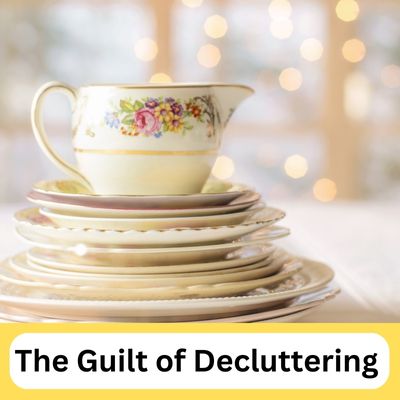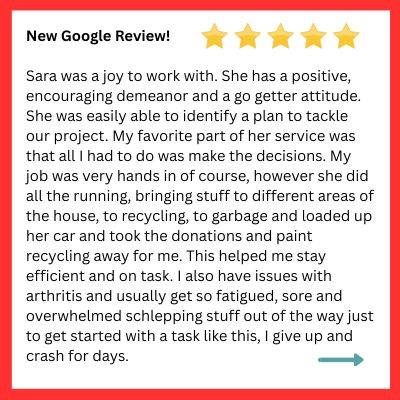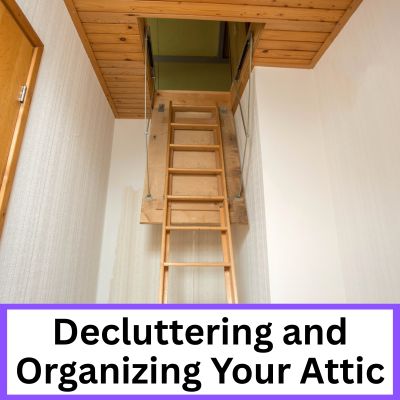The Guilt of Decluttering

People can be disorganized for a variety of reasons such as situational issues (moving, renovations, mobility issues, etc), other priorities, lack of time, lack of energy, and lack of skills, but probably the biggest reason people have trouble getting organized is the guilt of decluttering. Do you feel guilty just thinking about throwing things out? The guilt of decluttering will get easier the more you do it, but it also helps to understand more about guilt and what to do about it. In this post, I’ll talk about what the purpose of guilt is, types of clutter that induces guilt, and what to do to move beyond the guilt.
Karla McLaren has a great book called “The Language of Emotions: What Your Feelings Are Trying To Tell You”. It describes lots of different emotions (or mind states), and what their purpose is. Guilt is the knowledge and acknowledgment of wrongdoing. Guilt can help people “mature into a conscious and well-regulated person…[without it] you’ll be haunted by improper behaviors, addictions, and compulsions…Guilt helps people create a compassionate sense of ethics, the courage to judge and supervise your own conduct, and the strength to amend your behaviors without inflating or deflating your ego unnecessarily.” (Karla McLaren. Basically, guilt teaches us when we’ve done something wrong. But problems arise with guilt when we don’t learn from it and keep berating ourselves, or when we take on more responsibility than is necessary. Sometimes guilt is so habitual that even though someone hasn’t done anything wrong, people can still feel guilty.
Below are some of the most common issues that induce guilt when decluttering.
- Gifts
These can be gifts people have given you for whatever occasion. They can be big, small, handmade/artistic and one-of-a-kind or mass produced, but for whatever reason, you don’t want them anymore. Sometimes people try to pawn of their stuff on other people and mask it as a gift, but these are not gifts, and it’s important to recognize that.
- Other People’s Stuff
Obviously it’s not ok to declutter someone else’s stuff without asking, but most of the time the things in this category are from people who are deceased or who have downsized. Whether it be inherited belongings from parents or grandparents, or things that have been left in the house by a spouse or child, it can be really hard to part with this stuff! Other things that fit into this category aren’t gifts, but they are obligatory objects given to someone to hold onto to pass down through the generations. These can be all sorts of things such as photos, dolls, clothes, furniture, (really whatever!) and are usually given by another family member.
- Sentimental Items/ Family Heirlooms
China, figurines, a grandmother’s wedding gown, or other things that people have inherited would fall into this category. These items were valuable at one time, but probably aren’t valuable anymore. Sentimental items like mementos from trips, artwork, kid’s artwork, yearbooks, and journals would also fall into this category.
- Overbuying
This is where you’ve just bought TOO MUCH of something. It’s often consumables such as food, cleaning supplies, school/art supplies, or toiletries, but it can also be clothes, toys, or really anything. You’ve bought more than you can realistically use in a lifetime (or before something goes bad).
- Wasting
Maybe you bought something but lost it before you needed it, and then went out and bought more, and then you found the original purchase, but it’s too late to return it. Or maybe you bought something for a trip, left it at home, and now you don’t need it. Or perhaps you bought equipment for a hobby that you lost interest in. Your guilt will probably be heightened if the items were expensive since even if you do try to re-sell it, you probably won’t get what you paid for the item.
- Things Ending Up In The Landfill
You can do your best to get things to their new happy owners, but broken toys/toys with missing parts, half used toiletries, outdated/broken appliances, and worn out/broken furniture will most likely end up in the landfill.
- Wondering If You Will Need It
Anticipating the guilt of giving away something that you might need in the future is almost as bad as experiencing the guilt of needing something that you’ve given away. If you are someone who is apprehensive about giving something away and then needing it again, I can almost guarantee that you WILL give something away and you’re going to wish you didn’t. Your ego likes to play tricks on you and likes to prove that it was right. It’s important to just get comfortable making these types of mistakes, and remembering that you are resourceful and will be able to cope with any mistakes you make. It’s important to be compassionate with yourself if you do find yourself wanting something that you’ve given away. Once the initial pain goes away, you will probably realize that you either didn’t need it as much as you thought you did, or you can easily repurchase the item.
How can you process the guilt?
When processing your guilt, it’s important to do all these steps. If you’re still feeling guilty, go back and make sure you didn’t miss a step. Write your answers down if you have to. Perpetual feelings of guilt stem from a feeling of not feeling like you are enough. It’s important to repeat this exercise anytime you are feeling negative. Wallowing in negative emotions is not helping you or anyone else around you. The more you practice these steps, the more reflexive they will become. Get comfortable with feeling uncomfortable so that you can move through your guilt rather than keeping it trapped in your body.
- First, strengthen your boundaries. The best way to strengthen your boundaries is energetically. Imagine yourself centered within a large ball of white light, extending 10’ above, behind, below, in front of, and to the sides of you. Imagine a white light coming down through the top of your head, through your body, and out through your hands and feet. Imagine a grounding energy coming up through your feet, up through your body, and out your hands and feet. Remind yourself that this is your space, your time, and you are in charge of how you react to your emotions. Allow for your higher adult self to be in charge, not your ego.
- Identify the problem. For example, you are feeling guilty because you want to donate your grandmother’s china, or you want to throw out a bunch of half used cosmetics that you don’t like.
- State the facts. For example, you are in possession of something that you don’t want taking space in your house anymore.
- What can you do about it? You could take things to donation, you could give them away on Buy Nothing, you could throw them out or take them to the dump/ recycling center (or hire someone to come pick them up), or in some cases, you could sell the stuff you don’t want. Or you could keep the stuff and let someone else deal with it once you pass away.
- Now that you’ve decided what to do, do the thing! Always do your best, but don’t try to do more than your best or you will get burned out. If you don’t recycle something perfectly or donate something to the perfect place, it’s not the end of the world. Let go of the perfectionism, and embrace doing “good enough”.
- Ask yourself what you are grateful for in this experience. What lessons have you learned?
- Get back to joy! Once you’ve let go of your things (or saved them for someone else to deal with), get back to joy. Put a smile on your face, listen to your favorite music, go for a walk, pet a cute dog, or do whatever you like to do that makes you feel authentically happy.

By Jean Prominski, Certified Professional Organizer
Check out my media exposure: Seattle Sparkle in the Media
Download my free 5 week journal The Seattle Sparkle Method to Get Organized and Stay Organized
Sign up for my free 4 Day Color to Declutter Challenge.
Become part of a like-minded community by joining my Facebook Group, Declutter and Organize with Seattle Sparkle.
Ready to book a consultation? Complete this form.
For artwork to energize your home, order through jeanprominski.com.




